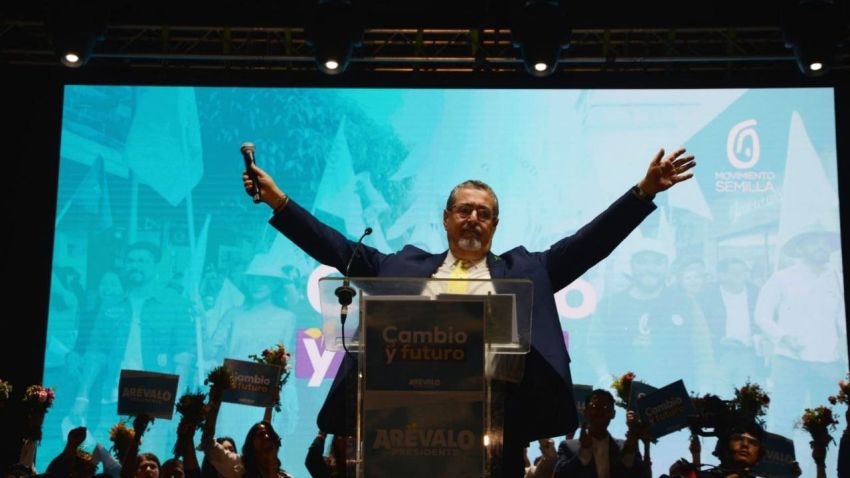
Against all odds, Bernardo Arévalo de León, candidate of the centre-left Movimiento Semilla, won the second round of presidential elections held in Guatemala on August 20 and will be the next president of the Central American country. The victory was the culmination of a people’s campaign that was built collaboratively and swept the Ancestral territories.
With 100% of the votes counted and a turnout of 45%, Arévalo achieved victory over the candidacy and the anti-rights project of Sandra Torres of the centre-right National Unity of Hope (UNE) party by a margin of 58% to 37%. He will take office as President on January 14. For many, Arévalo’s victory was a sign of hope for a country held hostage by the “pact of the corrupt”, a political, economic and religious elite united by patriarchal privileges.
Arévalo, son of history
There are at least two interesting facts about Arévalo. The first is that he is the son of Juan José Arévalo, the former socialist president who governed between 1945 and 1951 after a citizen revolution that led to the first transparent elections in the history of Guatemala. The other is that he carried the symbolic weight of having been the surprise candidate in the June 25 elections, who managed to gain the support of the people who relentlessly rejected the pact of the corrupt.
Since then, the question on everyone’s minds was about the political path the Movimiento Semilla would take, especially since it faced a powerful presidential candidate in Torres, a millionaire and representative of the establishment, an anti-rights figure who also carried out a hate campaign against feminist public policies and the recognition of LGBTI+ rights. Arévalo did not hesitate to champion a project antagonistic to that of hate. He rose to occasion: listening to and identifying himself with key political and symbolic references, such as traditional indigenous leaders and youth movements.
“Many people were determined to vote for Arévalo, who emerged from the citizens’ protests of 2015,” said journalist Lucía Escobar. “For the first time in history, the people came out to defend a candidate,” she added, referring to “the displays of affection at the rallies” as a phenomenon “never seen before in Guatemala.”
Escobar also noted the importance of the fact that there were Indigenous peoples who “had given the baton of authority” to Arévalo and concluded: “There is a lot of hope that this government will lay the foundation to kickstart the changes.”
Andrea Villagrán, a feminist lawmaker elected from the Movimiento Semilla, said that this is “a moment of transition and change in the course of history in which we are moving towards a new possibility of building a country and democracy.” She characterised the importance of leaving behind “a dictatorship of corruption and co-option of the State” as “an advance for which Guatemalans have fought for years.”
Victory day
“Let’s all vote with joy because that way, it is the people of Guatemala who will win.” With these words and amid enormous press coverage, Arévalo cast his vote around 9am in zone 2 of the capital city. He was accompanied by his Vice-Presidential candidate, Karin Herrera, who has campaigned in support of the rights of girls and women.
An hour and a half before the closing of the elections, both Movimiento Semilla and UNE held press conferences where they denounced different irregularities and urged the Prosecutor’s Office and the Supreme Electoral Tribunal (TSE) to investigate. The Movimiento Semilla specifically denounced intimidation and attempts to “buy votes in exchange for food” and the suspicion of “embezzlement of State funds,” claiming that the government of incumbent conservative president Alejandro Giammattei collaborated with Torres’ party.
“This is a systematic situation in several municipalities and there have been arrests,” said a spokesperson from Semilla, adding that “we are thinking of expanding this series of complaints”. For his part, Samuel Pérez, deputy and head of the Semilla bench, called on the people to vote earnestly. “It is fundamental that the people of Guatemala speak out forcefully at the polls, since this can change history forever,” because “the will of the people is what has to prevail”.
Later, members of the TSE reported that “there were 3468 voting centers set up inside and outside the country” and that the turnout, until 3 pm registered a “historic percentage”, with the conformation of “more than 20,000 polling stations” and “more than 7000 national and international electoral observers”. In addition, they formalised the resetting of the database and the opening of the computer program.
What followed was a quick count and the most hopeful news. A future with dignity and listening, without institutional persecution, is possible for Guatemala.
[Reprinted from Peoples Dispatch. This article was first published in Spanish on Marcha.]